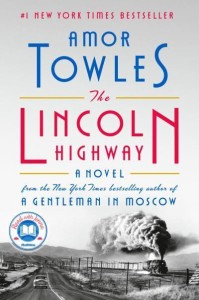
In this entertaining new book from the author of A Gentleman in Moscow, 18-year-old Emmett Watson is returned to his family’s farm in June of 1954 by the warden of the work farm where the young man has just served a brief term for involuntary manslaughter. Emmett has a well-thought-out plan for how to create a stable life for himself and his younger brother. The boys’ mother has long been out of the picture, so since their father’s death, eight-year-old Billy has been staying with neighbors, Mr. Ransom and his daughter Sally who is the one who does the brunt of the work.
Emmett wants to sell the farm and, with Billy, leave Nebraska and drive to California where he’ll build a business buying and rehabbing old houses. Billy, a great reader, particularly of a book with capsule lives of real and fictional adventurers, wants them to take the Lincoln Highway to San Francisco.
Unfortunately, Emmett’s plans are derailed by two stowaways from prison: his friends Duchess and Wooley who have their own plans for Emmett and themselves, which involve heading in the opposite direction. Duchess is a scamp, sometimes a scoundrel, while Wooley appears to be on the spectrum, scion of a patrician New York family who never could measure up in that world.
What makes each character interesting, for me at least, is that they have each worked out their own moral code. Of course these codes vary wildly, and seeing how the young men try to stay true to their code and their vision creates suspense. The other interesting aspect is the strong ties of friendship between the three young men and how each comes up with what they think is the best way to help each other while helping themselves.
The book is narrated from multiple points of view, which lets us follow the different characters as they separate and come together. However, it makes it hard to feel invested in any of the characters. Initially I was ready to engage with Emmett and care about his quest, but began to lose interest when his story is sidelined.
If you are sensing echoes of Huckleberry Finn and The Odyssey, you’re not alone. These implicit—and sometimes explicit—references add texture to the story.
As in the Moscow book, some parts are simply unbelievable. Fantastic elements are all well and good, but when they pop up once you’re well into what purports to be a realistic book, it can feel like a betrayal.
My book club mostly found it a light read. We discussed what the book was about, perhaps the idea that we may think we’re in control, but we’re not, either because of destiny or chaos theory. Certainly it’s about human connections. We loved how the characters took care of each other, their tenderness and hopefulness. It’s essentially a “band of brothers” story.
There’s a jaunty tone to the book, even during episodes of danger and great violence, along with a sense that every risky move turns out okay. The combination made me feel that this was actually a middle grade book. A quick read despite its length, it’s a pleasant bit of fluff.
Do you have a favorite Amor Towles book?